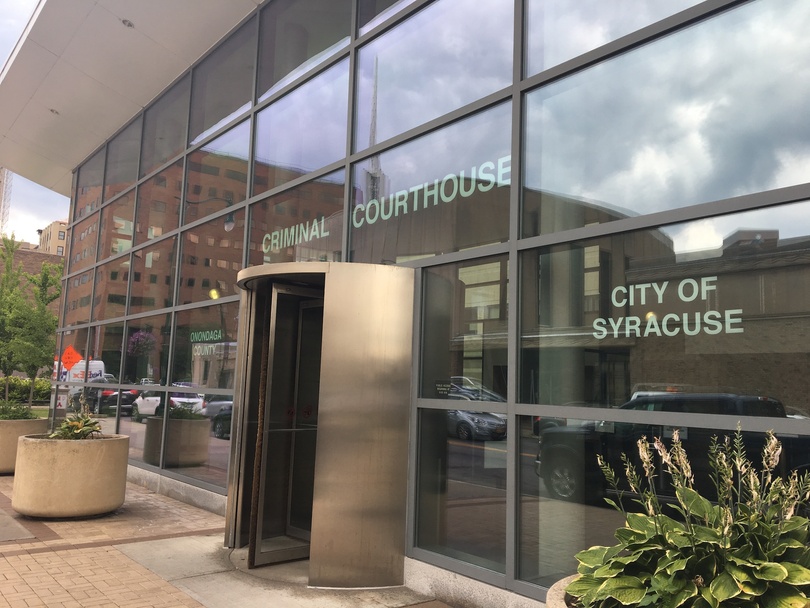Closing statements made in murder trial linked to Syracuse University student’s death

Inside the Onondaga County/City of Syracuse Criminal Courthouse, lawyers made closing arguments Monday in the murder trial concerning the death of an SU student. Michael Burke | Senior Staff Writer
The trial of two men charged with murdering a Syracuse University student neared its end Monday as the prosecution and defense each made closing statements.
A jury of two men and 10 women will begin deliberating Tuesday after the judge overseeing the trial, John Brunetti, gives them a final set of instructions.
Cameron Isaac, 24, of North Syracuse and Ninimbe Mitchell, 20, of North Syracuse are charged with first- and second-degree murder, respectively, in connection to the death of Xiaopeng “Pippen” Yuan, an SU student. Prosecutors allege that on Sept. 30, 2016, Isaac robbed Yuan of 2 pounds of marijuana before killing him. Mitchell, who drove Isaac to and from the scene of the incident, is accused of acting as an accomplice to Isaac.
Closing statements in the trial were made Monday after the defense called four more witnesses in the morning and subsequently rested its case.
William Sullivan, the attorney for Isaac, used his closing statement to argue that the evidence the prosecution presented wasn’t conclusive enough for the jury to convict Isaac.
Last week, Rafal Dobrowolski, an expert in cellphone mapping and analysis, used Google Maps to display to jurors that the cellphones belonging to Isaac and Mitchell were in roughly the same location where Yuan was killed at the time he was killed.
In his closing statement, Sullivan pointed out that the records Dobrowolski relied upon come with a disclaimer to “exercise caution” when using the data for investigative purposes.
Sullivan also emphasized to jurors that there was a 47-day gap between when the incident occurred and when authorities searched Isaac’s apartment, where they discovered bullets closely resembling the one that killed Yuan.
“You should have doubts,” Sullivan told jurors. “You should be filled with doubt.”
The attorney for Mitchell, Paul Carey, argued in his closing statement that none of the prosecution’s evidence directly tied any crimes or knowledge of any crimes to Mitchell. Authorities were unable to investigate Mitchell’s phone because they did not have a password to unlock it.
Carey said Monday, as he has throughout the trial, that Mitchell was simply an “Uber driver” to Isaac.
“There is no evidence (Mitchell) had a state of mind for a robbery,” Carey said. “None. Zero.”
In his own closing statement, Onondaga County District Attorney William Fitzpatrick told jurors that the truth of the case was simple — a coordinated robbery-turned-murder that both Isaac and Mitchell were in on.
Fitzpatrick said Isaac and Mitchell “were on the same team” on the day of Yuan’s murder. He pointed out that Isaac would frequently make phone calls to Mitchell when he was texting Yuan, which Fitzpatrick said was evidence Mitchell was involved in the plot.
Fitzpatrick also pointed out during his closing statement that Isaac lied to Yuan by giving him a false name and telling him he was a student at Le Moyne College.
“If this is a legitimate drug deal, why lie about who you are? Because it’s not a legitimate drug deal,” Fitzpatrick said. “It’s a rip-off.”
He pleaded with jurors to “use your common sense” when they begin deliberations Tuesday morning.
“This is exactly how it appears,” Fitzpatrick said. “Just because we’re in trial doesn’t mean this is complicated.”
Before closing arguments were made Monday, the defense called four witnesses to the stand, including Mitchell’s girlfriend as well as the grandmother and grandfather of Mitchell. All three testified to seeing Mitchell in the days leading up to the alleged murder, something the prosecution didn’t dispute.




